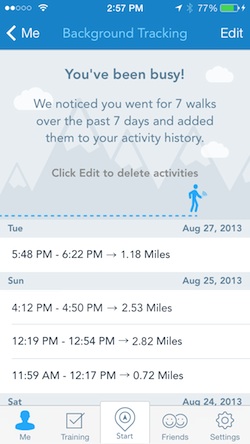 When Apple announced the inclusion of the M7 motion co-processor with the iPhone 5s, MobiHealthNews asked fitness tracking startups to respond to the news. "You can expect that we’ll be incorporating these improvements in a meaningful way as we go," RunKeeper CEO Jason Jacobs told MobiHealthNews at the time. "Stay tuned.”
When Apple announced the inclusion of the M7 motion co-processor with the iPhone 5s, MobiHealthNews asked fitness tracking startups to respond to the news. "You can expect that we’ll be incorporating these improvements in a meaningful way as we go," RunKeeper CEO Jason Jacobs told MobiHealthNews at the time. "Stay tuned.”
Now Runkeeper has made good on that assertion. For iPhone 5s users, the updated RunKeeper app will allow users to retroactively enter data from a run or walk of 15 minutes or more. Assuming users opt in, the feature, called Pocket Track, will automatically track runs or walks throughout the day. Users can add the passively tracked data into their RunKeeper accounts at any time.
The motion co-processor also allows RunKeeper to track an additional metric for runners -- step cadence, or steps taken per minute. That information will be added to elevation and pace as data that users can see as they run and also aggregate in charts at the end of a workout.
The company is also adding AirDrop functionality for iOS users. AirDrop is an Apple feature that allows someone to transfer a file over a secure wifi connection to another nearby device. For RunKeeper, AirDrop will allow users to more easily add other RunKeeper users to their RunKeeper friend network. Also, a person who uses RunKeeper individually can share a workout routine he or she designed with a group of other RunKeeper users.
Strava Run and Argus's Azumio have both updated their apps to make use of the M7 co-processor. In addition, since Apple's announcement, passive tracking app Moves from ProtoGeo has expanded into Android, and is planning an iOS7 update which will likely utilize the M7 co-processor.
Meanwhile, both Google and Basis Science have launched passive tracking updates. Basis updated its device to passively differentiate between biking, walking, and running, while Google added a passive step counter to the latest iteration of Android.














